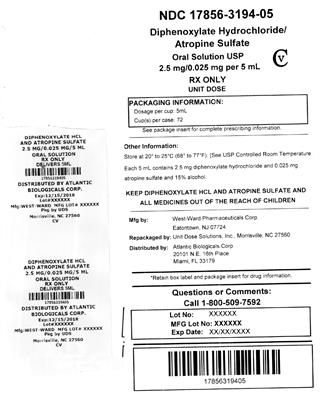Diphenoxylate Hydrochloride And Atropine Sulfate Solution while Breastfeeding

What is Diphenoxylate Hydrochloride And Atropine Sulfate Solution used for?
Is Diphenoxylate Hydrochloride And Atropine Sulfate Solution safe to use while breastfeeding? Can it interfere with growth and development of my kid?

Nursing Mothers Caution should be exercised when diphenoxylate hydrochloride and atropine sulfate is administered to a nursing woman, since the physicochemical characteristics of the major metabolite, diphenoxylic acid, are such that it may be excreted in breast milk and since it is known that atropine is excreted in breast milk.
Diphenoxylate Hydrochloride And Atropine Sulfate Solution Breastfeeding Analsys
Atropine sulfate while Breastfeeding
SafeCAS Number: 51-55-8
Either isolated dose or topical medication are safe for breastfed babies. Anti-cholinergic drugs decrease Prolactin and Oxytocin hormone secretion. Long-standing Atropine treatment could affects mother's milk production. American Academy of Pediatrics: Maternal Medication Usually Compatible With Breastfeeding.
Diphenoxylate Hydrochloride And Atropine Sulfate Solution Breastfeeding Analsys - 2
Diphenoxylate hydrochloride while Breastfeeding
CAS Number: 915-30-0
No data exist on the use of diphenoxylate during breastfeeding. One expert panel considers diphenoxylate to be unacceptable during breastfeeding.[1] Based on its chemical and pharmacological similarity to narcotics, occasional small doses of diphenoxylate may be acceptable while breastfeeding an older infant, but alternatives are preferred, especially while nursing a newborn.
Atropine sulfate while Breastfeeding
CAS Number: 51-55-8
No information is available on the use of atropine during breastfeeding. Long-term use of atropine might reduce milk production or milk letdown, but a single systemic or ophthalmic dose is not likely to interfere with breastfeeding. During long-term use, observe for signs of decreased lactation (e.g., insatiety, poor weight gain).
Diphenoxylate Hydrochloride And Atropine Sulfate Solution Breastfeeding Analsys - 3
Diphenoxylate hydrochloride and Breastfeeding
DangerousWhat should I do if I am breastfeeding mother and I am already exposed to Diphenoxylate Hydrochloride And Atropine Sulfate Solution?
You should immediately inform your health care provider about Diphenoxylate Hydrochloride And Atropine Sulfate Solution usage and your breastfeeding interval after usage of
My health care provider has asked me to use Diphenoxylate Hydrochloride And Atropine Sulfate Solution, what to do?
Please double check with your doctor if he is aware of your breastfeeding stratus, Ask your doctor if there is any safe alternative of Diphenoxylate Hydrochloride And Atropine Sulfate Solution. Check with your doctor if you shall temporally stop breastfeeding. You may go for second opinion as well. Still after all of this if your doctor still recommends Diphenoxylate Hydrochloride And Atropine Sulfate Solution then go for it as they have access on more detailed medical and scientific information and they understand your individual medical situation much better.
If I am using Diphenoxylate Hydrochloride And Atropine Sulfate Solution, will my baby need extra monitoring?
Extreme level of monitoring required as Diphenoxylate Hydrochloride And Atropine Sulfate Solution could be dangerous for kid.
Who can I talk to if I have questions about usage of Diphenoxylate Hydrochloride And Atropine Sulfate Solution in breastfeeding?
US
National Womens Health and Breastfeeding Helpline: 800-994-9662 (TDD 888-220-5446) 9 a.m. and 6 p.m. ET, Monday through Friday
UK
National Breastfeeding Helpline: 0300-100-0212 9.30am to 9.30pm, daily
Association of Breastfeeding Mothers: 0300-330-5453
La Leche League: 0345-120-2918
The Breastfeeding Network supporter line in Bengali and Sylheti: 0300-456-2421
National Childbirth Trust (NCT): 0300-330-0700
Australia
National Breastfeeding Helpline: 1800-686-268 24 hours a day, 7 days a week
Canada
Telehealth Ontario for breastfeeding: 1-866-797-0000 24 hours a day, 7 days a week
